| "Change the world this time, will you? Fucking well needs it." |
| Geordie's advice to Nicky in the lead-up to a general election |
I wasn't born or raised in the north, and until recently didn't have any friends who lived there. As a young socialist growing up in the south, this sometimes felt like a credibility millstone, in part because this is where Margaret Thatcher's greed bomb exploded, tarring everyone born in the southern counties with the same wretched pinstripe or barrow-boy brush. It's also fair to say that the north has repeatedly born the brunt of regressive Tory legislation, being far enough from the capital and the common concept of 'Middle England' – whatever the hell that really is – to be of seemingly little concern to those passing the legislation. What the Left of the north always had, something that was too often in short supply down our way, was a strong sense of solidarity and communal unity, in part because of the damage done to those very communities by legislation they were instrumental in opposing. And even today, the song remains the same. Although I live in the southern region that has been calculated to take the biggest hammering from David Cameron's ideologically motivated spending cuts,* it's once again the North East and the Midlands that are set to come off worst, with Middlesborough predicted to suffer the heaviest blow.
It's thus no wonder that perceptions of a north-south divide continue to exist and that a contempt for anyone born south of Manchester remains as strong as ever is some quarters. There's even a "We Hate Southern Bastards!" page on Facebook – pity there's not more on it than a short list of prejudicial gripes. Such geographical divisions subtly but effectively underscore Peter Flannery's rightly acclaimed 1996 TV drama Our Friends in the North, which charts the fortunes and shifting relationships of four Newcastle friends – Nicky, Geordie, Mary and Tosker – from 1964 to 1996, and how they are affected by the social and political changes that the country underwent during that period. With a supporting cast peppered with established talent of some repute, it features in the leading roles four young actors at the dawn of their film and television careers, ones whose faces and names have become, shall we saw, a little more familiar in the intervening years.
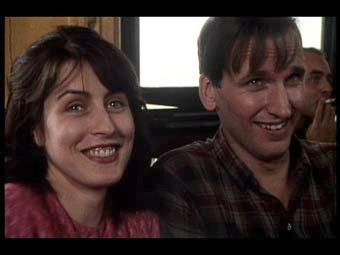
Episode one kicks off as Nicky (a passionate and energised Christopher Eccleston in one of his best ever screen performances) arrives home from a period of political awakening in America. Though it initially feels like we've joined the story a couple of episodes in, this actually allows for some economical scene-setting and character introductions, as Nicky catches up on old news, re-bonds with his friends Geordie (a young and consistently superb Daniel Craig) and Tosker (an impressive Mark Strong in the series' least sympathetic lead role), and rekindles a friendship with Mary (Gina McKee, also excellent) that both of them know could and should be something more. It's an important moment for their collective friendship, being the last time they'll be able to rely on its bonds to unite them.
The times, as the song says, are a-changing, and are soon to affect each member of this quartet in very different ways. The politicised Nicky begins working for local Labour candidate Austin Donohue (RSC regular Alun Armstrong), Tosker hangs on to his dream of becoming a professional musician, and Geordie flees his abusive and alcoholic father by heading down to London in search of a new start. Nicky's indecision over Mary, meanwhile, allows the cocksure Tosker to effectively nab her from under his nose. Things don't quite work out as expected for any of them. Nicky is given cause to question his work for Donohue following his dealings with corner-cutting building contractor John Edwards (Geoffrey Hutchings) and begins drifting towards more radical politics. Having arrived in London, a chance encounter sees Geordie land a job with underworld kingpin Benny Barrett (a suitably imposing Malcolm McDowell) and he soon finds himself climbing the London criminal ladder, while an introduction to Barrett allows Tosker, whose musical ambitions have been smashed, to open a small fruit and veg business and start mixing with those in a position to help him move on to higher things.
This, I should point out, is merely the skeleton on which the multi-stranded and densely plotted flesh of the series is built. Each of the four stories is littered with social, political and personal detail, and if Mary seems not to figure prominently in the above summary, it's because her tale is initially one of increasingly unhappy subjugation, from which she later emerges as perhaps the most forward-looking and level-headed of the four, though no less wrapped up in her own obsessions.
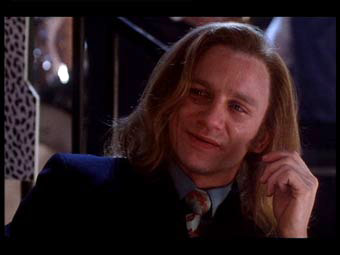
Although unfolding in linear fashion, the episodes are each set in sequential UK election years and include many of the defining events in modern British socio-political history, including the rise and fall of the militant left, corruption in the Metropolitan Police, the damaging influence of freemasonry, the power and eventual demise of gang controlled porn empires, the election of Margaret Thatcher, the 1984 miner's strike, the smear campaigns of the yellow press, and the birth of New Labour. Far from being mere background detail, the divergent paths taken by the four allow the programme to explore each of these events from the viewpoint of those involved and directly affected. To do justice to each element, the main character pool is expanded to include Nicky's once politically active father Felix (a superb Peter Vaughan), long-standing local Labour politician Eddie Wells (David Bradley, bristling with old-school integrity), dodgy Tory politician Claude Seabrook (Julian Fellowes) and his politically ambitious daughter Claudia (Saskia Wickham), corrupt detective John Salway (David Schofield) and his straight-flying colleagues Ron Conrad (the always impressive Danny Webb) and Dennis Cockburn (Trevor Cooper), and no-nonsense investigating officer Roy Johnson (a lovely, take-no-prisoners turn from Tony Haygarth), to name but a few. Many are given extra bite by being drawn from real life,** their close mirroring of actual events and personalities being the key reason for the BBC's initial reluctance to green-light the series, despite its prior success as a Royal Shakespeare Company play.
Structurally, the series still feels rewardingly adventurous, and by confining each episode to a specific year and not showing through flashback the intervening action, it is left to us to extrapolate from the dialogue and observational detail what has occurred between episodes, just as we would were intermittently meeting up with distantly located friends. While some of these transitions have an inevitability to them – the birth and growth of Tosker and Mary's son Anthony, for example – others require some interpretive adjustment, as with Nicky's transformation from disgruntled left-winger to committed anarchist, or his return from world travels as a renowned photographer with a respected book to his name. Others are played for dramatic effect, notably Geordie's re-appearance after a considerable absence as an emotionally damaged derelict, chanced upon by Nicky when photographing the homeless and as surprising to us as it is to him.
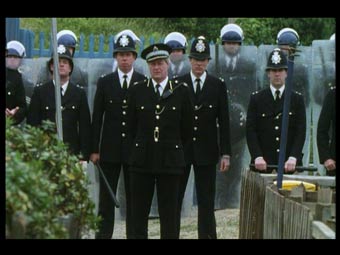
Although the the fates of the characters are as much down to their own self-absorption as the external forces that shape their communities, they're still portrayed largely as the good guys of the piece, at least compared to their London based counterparts. The southerners here are a consistently rum bunch, from manipulative and vengeful porn baron Benny Barrett to the primly self-righteous Claudia Seabrook – even the feminist girlfriend Nicky brings back from the big city is saddled with an air of social superiority. But it's the Metropolitan Police that cop the most flack here, hardly surprising given the level of corruption that was exposed by real-life Manchester investigating officer Frank Williamson, on whom Roy Johnson is directly based. They even at one point become a destructive force, unleashed on a small Newcastle community whose striking miners have a mutually respectful and easy-going relationship with the local police (who include in their number Mary's now adult son Anthony), which is shattered by the violence that is inflicted and provoked by these uniformed outsiders, who've been drafted in to allow scab labour to enter the pits unchallenged.
It may sound like we're trading in stock characters and political clichés, but a real strength of the series is that despite taking a leftist viewpoint it refuses to (over-) play to the political gallery. Thus, while Claudia Seabrook may epitomise everything that is inherently creepy about a young Conservative debutante who knows just how to play the press, she believes in what she stands for and is not above telling her smarmy PR toad Colin Butler (an oily Pete Lee-Wilson) – whose speech to the party faithful could almost have been lifted from the current Tory manifesto – to fuck off. Others are given a similarly fair shake, with sympathetically portrayed anarchists, dedicated and put-upon Met officers, and a corrupt Labour councillor who does the wrong thing for what he genuinely believes are the right reasons. The tabloid press come across as irredeemably scummy, but given their penchant for distortion and outright lies and the harm they inflicted on potentially progressive figures of the time, I see no good reason to paint them as anything else.
Given Flannery's viewpoint, it's hardly surprising that Nicky's speeches to the party faithful come across as the most impassioned and convincing, but they're also well written enough to pass for the real thing and are delivered with the sort of passion and self-belief that the art of spin has rendered increasingly rare in the real world. His conviction is not confined to the meeting hall, and when Nicky talks politics does so from the heart, even to his own family – "When there's so much to be angry about," he complains to Felix, "why do you get angry with me?" This is grass roots socialism that may embrace old school Labour principles but doesn't automatically trust its representatives and clearly favours the sincerity of politicians like Eddie Wells over media savvy dealers like Austin Donohue, for all of his drive and good intentions. Intriguingly, the series first aired a year before Tony Blair led New Labour to power and politicians like Wells were effectively confined to history.
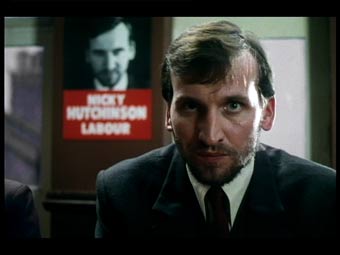
That it never plays like a polemic is down in no small part to Flannery's willingness to explore the flaws, uncertainties, and even self-delusion of his characters and his refusal to place them in easily definable boxes. This is followed through in the impeccable handling (how often have we seen potentially fine TV drama scripts homogenised by off-the-peg casting and formulaic filmmaking?), with different time periods handled individually by directors Simon Cellan Jones and Pedr James (see the extras section for more on this), the shift between the filmmakers occurring without a hint of visual or dramatic discontinuity.
Rounding things off is a sensibly rationed but still emotive use of hit songs of the various periods, which while occasionally seem to be commenting on the action, are all carefully chosen as representative both of the mood and the specific energy of the year they represent. The climactic coup de grace is the emotionally charged use of Don't Look Back in Anger by Oasis, which at the time of production was little more than a track from their second album, but in a rather splendid piece serendipity was released as a single and went to number 1 the week before the final episode was screened. And I couldn't care less if you don't like Oasis, because as a marriage of picture to music it just works, a melancholic but sublimely executed finale to what to date has remained the last really ambitious dramatic serial produced at the BBC.***
Televisions have changed quite a bit in what feels a short space of time. In these days of large widescreen plasma, LCD and LED screens, it's becoming increasingly rare to find a living room with a 4:3 CRT in the corner. Anamorphic transfers have long since become the standard for widescreen film and television on DVD, and anything shot on film can also be remastered from the original film elements, which in the case of 35mm series like The Avengers and The Prisoner have produced spectacular results. Our Friends in the North was shot 14:9 on 16mm film, so it's reasonable to hope that any new DVD release would feature an anamorphic transfer that allows us to view the series at premium quality. So why in hell are we looking at a letterboxed widescreen transfer (windowboxed, actually, as there are also small borders on each side as well) in a 4:3 frame? Well, because that's how it was presented on the previous DVD release from BMG and this is essentially the same transfer, presumably sourced from a broadcast tape original. It thus has the same strengths and weaknesses as its predecessor – the detail is good, the colour reasonably accurate, and the picture is largely clean of damage and dust spots (there's a brief video blip in one of the later episodes), but the contrast is far too harsh throughout, giving rock solid blacks at the expense of detail in darker areas or colours – if someone in black clothing stands against a gloomy background you're almost looking at a floating head.
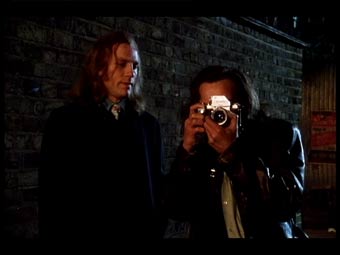
Despite having no real show-off elements, the Dolby 2.0 stereo soundtrack is a clear and well-balanced mix with a decent tonal range, a crisp reproduction of sound effects, and a subtle but clearly detectable frontal separation. Music fares particularly well, whether it be Colin Towns' fine score or the aforementioned source tracks, and it really is worth cranking up the volume for maximum emotional effect when the Oasis track...erm...fades out. Eh? Having been one of many who championed this finale on the original broadcast, I was somewhat stunned to hear the track fade to silence almost as soon as the credits begin to roll, credits that were originally timed to the length of the song and concluded simultaneously. It was part of why that ending worked so well, giving the series a potent sense of closure that rang around your head long after the credits had finished rolling. It's there on the original DVD release, so why not this one? I can only conclude that we're looking at a rights issue here, but a peculiar one that has allowed part of the song to be used but not the whole thing. It doesn't ruin the ending, but it does give it an unwelcome kick in the nuts and effectively constitutes a cut, making this an incomplete version of a great television series.
The original BMG release did well on extras, having interactive credits, filmographies and information on the music for each episode, plus a fourth disc devoted exclusively to special features. Included was the textual reconstruction of the original version of episode one, which was directed by Stuart Urban, who left the project two episodes in after disagreements with the production team. Also on board were interviews with actors Eccleston and McKee, a photo gallery, and a fascinating, forty-minute round-table discussion with Peter Flannery, producer Charlie Pattison, executive producer Michael Wearing, and directors Pedr James and Simon Cellan Jones. Now since the transfer has been ported over from the BMG release, you might expect the extras to also be present, but not only has the fourth disc done a vanishing act, but the extras on each of the episode discs have also been removed. All you get here is the show itself.
Although it's great to have this fine series available on DVD again, repackaging the previous letterboxed transfer and stripping all the extras is a huge disappointment, while the fading out of the final song damages one of television history's most memorable endings. All of which makes it hard to recommend this Simply Media three-disc set, despite being the only version currently on release of a series you really should have in your collection. Fans who do not already own the BMG release should try to find a copy if they can – the transfer's the same, but the extra features and the uncut music make it worth the extra you'll likely have to pay.
* According to research carried out by Experian on behalf of the BBC to determine which areas would be most resilient to the proposed cuts, our region, which already has one of the highest unemployment rates in the south, ranks 295 out of 324. Recently a low paid manual post at my workplace attracted over one hundred and twenty applications from people who, despite current propaganda to the contrary, are desperately seeking work.
** The real-life public figures drawn on here include Labour council leader T. Dan Smith, architect and freemason John Poulson, Home Secretary Reginald Maudling, Newcastle businessman Sir John Hall, and ex-Chief Constable Frank Williamson.
*** Some fine work has been done by the corporation since, a personal favourite being their compelling 2004 adaptation of Jake Arnott's novel The Long Firm, which also starred Mark Strong in a performance that should have had studio casting execs knocking on his door. But as the BBC is pushed towards a more commercially minded output at the expense of the sort of quality that Our Friends has in spades, the only series I've seen since that delivered the dramatic and artistic goods at the same level is Channel Four's compelling Red Riding Trilogy.
|